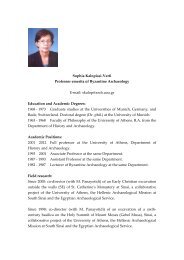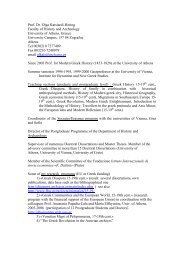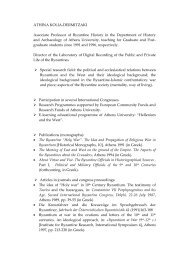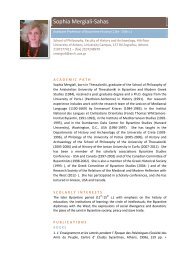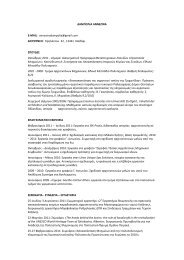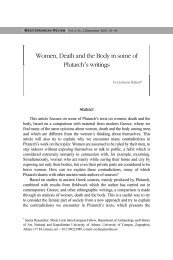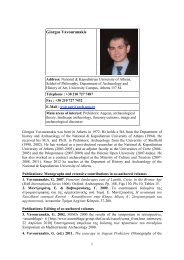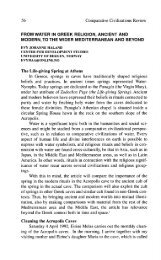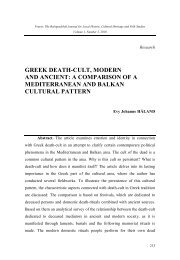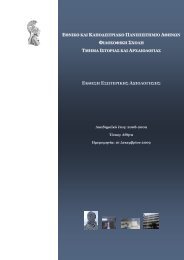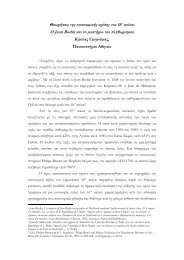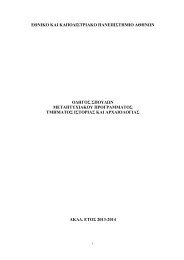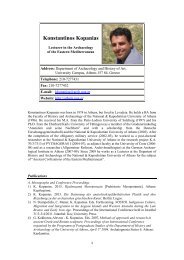The Dormition of the Virgin Mary on the Island of Tinos: A ...
The Dormition of the Virgin Mary on the Island of Tinos: A ...
The Dormition of the Virgin Mary on the Island of Tinos: A ...
You also want an ePaper? Increase the reach of your titles
YUMPU automatically turns print PDFs into web optimized ePapers that Google loves.
116 JOURNAL OF RELIGIOUS HISTORY<br />
value-system. This is <str<strong>on</strong>g>the</str<strong>on</strong>g> value-system from which <str<strong>on</strong>g>the</str<strong>on</strong>g> festival and <str<strong>on</strong>g>the</str<strong>on</strong>g> society<br />
which it reflects, traditi<strong>on</strong>ally have been c<strong>on</strong>sidered. <str<strong>on</strong>g>The</str<strong>on</strong>g> absence <str<strong>on</strong>g>of</str<strong>on</strong>g> <str<strong>on</strong>g>the</str<strong>on</strong>g> female<br />
value-system leaves previous analyses <strong>on</strong>e-sided and incomplete. <str<strong>on</strong>g>The</str<strong>on</strong>g>refore, a<br />
comprehensive analysis requires <str<strong>on</strong>g>the</str<strong>on</strong>g> female point <str<strong>on</strong>g>of</str<strong>on</strong>g> view to be included. I have<br />
argued <str<strong>on</strong>g>the</str<strong>on</strong>g> importance <str<strong>on</strong>g>of</str<strong>on</strong>g> changing our approach when working with <str<strong>on</strong>g>the</str<strong>on</strong>g><br />
material. Taking account <str<strong>on</strong>g>of</str<strong>on</strong>g> <str<strong>on</strong>g>the</str<strong>on</strong>g> female sphere in Greece provides us with a<br />
basis for c<strong>on</strong>sidering <str<strong>on</strong>g>the</str<strong>on</strong>g> female part <str<strong>on</strong>g>of</str<strong>on</strong>g> society. 61 But by so doing <str<strong>on</strong>g>the</str<strong>on</strong>g> <str<strong>on</strong>g>of</str<strong>on</strong>g>ficial<br />
male perspective, which is similar to <str<strong>on</strong>g>the</str<strong>on</strong>g> Western male perspective generally<br />
applied within Greek studies, has to be dec<strong>on</strong>structed. By analysing <str<strong>on</strong>g>the</str<strong>on</strong>g> festival,<br />
we may locate two c<strong>on</strong>tradictory views, <strong>on</strong>e c<strong>on</strong>nected with <str<strong>on</strong>g>the</str<strong>on</strong>g> female<br />
sphere and <str<strong>on</strong>g>the</str<strong>on</strong>g> o<str<strong>on</strong>g>the</str<strong>on</strong>g>r c<strong>on</strong>nected with <str<strong>on</strong>g>the</str<strong>on</strong>g> male sphere. This means that <str<strong>on</strong>g>the</str<strong>on</strong>g>re is<br />
not a <strong>on</strong>e-way power or male dominance in <str<strong>on</strong>g>the</str<strong>on</strong>g> Greek cultural area, but ra<str<strong>on</strong>g>the</str<strong>on</strong>g>r<br />
competing powers related to men and women and <str<strong>on</strong>g>the</str<strong>on</strong>g>ir respective spheres. <str<strong>on</strong>g>The</str<strong>on</strong>g><br />
two opposing value-systems are never<str<strong>on</strong>g>the</str<strong>on</strong>g>less both complementary and interdependent.<br />
One may perhaps argue that <str<strong>on</strong>g>the</str<strong>on</strong>g> distincti<strong>on</strong> between popular and<br />
<str<strong>on</strong>g>of</str<strong>on</strong>g>ficial is more useful than <str<strong>on</strong>g>the</str<strong>on</strong>g> distincti<strong>on</strong> between female and male since<br />
women have become more involved in <str<strong>on</strong>g>the</str<strong>on</strong>g> male sphere and vice versa. From an<br />
historical perspective, however, this is a recent occurrence, just as <str<strong>on</strong>g>the</str<strong>on</strong>g> mingling<br />
<str<strong>on</strong>g>of</str<strong>on</strong>g> <str<strong>on</strong>g>of</str<strong>on</strong>g>ficial and popular rituals also is a later occurrence. Still it is possible to<br />
generalize about female and male values in Greece, although it might seem<br />
strange from a northwest-European point <str<strong>on</strong>g>of</str<strong>on</strong>g> view, which is generally very<br />
similar to <str<strong>on</strong>g>the</str<strong>on</strong>g> <str<strong>on</strong>g>of</str<strong>on</strong>g>ficial male perspective in Greece. I have argued this elsewhere<br />
and <str<strong>on</strong>g>the</str<strong>on</strong>g>re is no space for me to discuss this here. 62 Accordingly, I have found<br />
that <str<strong>on</strong>g>the</str<strong>on</strong>g> gendered values are more fruitful when trying to write women into <str<strong>on</strong>g>the</str<strong>on</strong>g><br />
history, and <str<strong>on</strong>g>the</str<strong>on</strong>g>reby also questi<strong>on</strong> <str<strong>on</strong>g>the</str<strong>on</strong>g> ways in which history has been written<br />
through <str<strong>on</strong>g>the</str<strong>on</strong>g> ages, trying to supplement a male with a female perspective.<br />
Although male pilgrims become more and more active in <str<strong>on</strong>g>the</str<strong>on</strong>g> festival, and most<br />
female pilgrims pray for <str<strong>on</strong>g>the</str<strong>on</strong>g>ir families that, <str<strong>on</strong>g>of</str<strong>on</strong>g> course, include male members,<br />
and in that sense male participants are indirectly included in <str<strong>on</strong>g>the</str<strong>on</strong>g> female sphere<br />
<str<strong>on</strong>g>of</str<strong>on</strong>g> <str<strong>on</strong>g>the</str<strong>on</strong>g> festival, this does not make it male. It ra<str<strong>on</strong>g>the</str<strong>on</strong>g>r shows that <str<strong>on</strong>g>the</str<strong>on</strong>g> active male<br />
participants adapt to <str<strong>on</strong>g>the</str<strong>on</strong>g> female value system and that c<strong>on</strong>cerning <str<strong>on</strong>g>the</str<strong>on</strong>g> latter<br />
(i.e., female values), we see <str<strong>on</strong>g>the</str<strong>on</strong>g> importance <str<strong>on</strong>g>of</str<strong>on</strong>g> female acti<strong>on</strong>s (i.e., prayers) to<br />
61. In this way we also realize that that which from <str<strong>on</strong>g>the</str<strong>on</strong>g> male sphere, ideology, and value-system<br />
seems to be at <str<strong>on</strong>g>the</str<strong>on</strong>g> margin, in fact becomes <str<strong>on</strong>g>the</str<strong>on</strong>g> centre, since marginalizati<strong>on</strong> is a spatial metaphor<br />
and depends <strong>on</strong> where you are standing, cf. Håland, “Greek Women and Death, Ancient and<br />
Modern” for discussi<strong>on</strong>.<br />
62. Håland, Greek Festivals, Modern and Ancient. For <str<strong>on</strong>g>the</str<strong>on</strong>g> following argument, see also Håland,<br />
“Greek Women and Death, Ancient and Modern”. One <str<strong>on</strong>g>of</str<strong>on</strong>g> my male informants from <strong>Tinos</strong> is in <str<strong>on</strong>g>the</str<strong>on</strong>g><br />
navy and <strong>on</strong>e <str<strong>on</strong>g>of</str<strong>on</strong>g> my female informants is also in <str<strong>on</strong>g>the</str<strong>on</strong>g> armed forces. Like <str<strong>on</strong>g>the</str<strong>on</strong>g> abbess in <str<strong>on</strong>g>the</str<strong>on</strong>g> M<strong>on</strong>astery<br />
<str<strong>on</strong>g>of</str<strong>on</strong>g> Kekhrovouno (where Pelagia lived), and <str<strong>on</strong>g>the</str<strong>on</strong>g> late prime minister Andreas Papandreou’s wife,<br />
Dēmētra, <str<strong>on</strong>g>the</str<strong>on</strong>g>y all regard <str<strong>on</strong>g>the</str<strong>on</strong>g> Panagia as a protective mo<str<strong>on</strong>g>the</str<strong>on</strong>g>r. One <str<strong>on</strong>g>of</str<strong>on</strong>g> <str<strong>on</strong>g>the</str<strong>on</strong>g> reas<strong>on</strong>s that Papandreou’s<br />
former wife, <str<strong>on</strong>g>the</str<strong>on</strong>g> American-born Margaret was very unpopular am<strong>on</strong>g Greek women, was that she<br />
did not share <str<strong>on</strong>g>the</str<strong>on</strong>g>ir female values, cf. Håland, Greek Festivals, Modern and Ancient, ch. 6; Dubisch,<br />
In a Different Place, ch. 11. In a Greek Orthodox c<strong>on</strong>tra American or Western c<strong>on</strong>text <str<strong>on</strong>g>the</str<strong>on</strong>g>n, female<br />
values absorb <str<strong>on</strong>g>the</str<strong>on</strong>g> male and become Greek versus American or Western. This is also discussed by<br />
Håland in Competing Ideologies in Greek Religi<strong>on</strong>, Ancient and Modern, cf. Dubisch, In a<br />
Different Place. Cf, for example, Alexiou, After Antiquity, for <str<strong>on</strong>g>the</str<strong>on</strong>g> gendered values in Greece and<br />
how <str<strong>on</strong>g>the</str<strong>on</strong>g>y differ from Northwestern Europe and <str<strong>on</strong>g>the</str<strong>on</strong>g> USA. C<strong>on</strong>cerning competing and simultaneously<br />
intersecting values, cf. Eade and Sallnow, C<strong>on</strong>testing <str<strong>on</strong>g>the</str<strong>on</strong>g> Sacred, versus Turner, “Pilgrimages<br />
as Social Processes.”<br />
© 2012 <str<strong>on</strong>g>The</str<strong>on</strong>g> Author<br />
Journal <str<strong>on</strong>g>of</str<strong>on</strong>g> Religious History © 2012 Religious History Associati<strong>on</strong>



